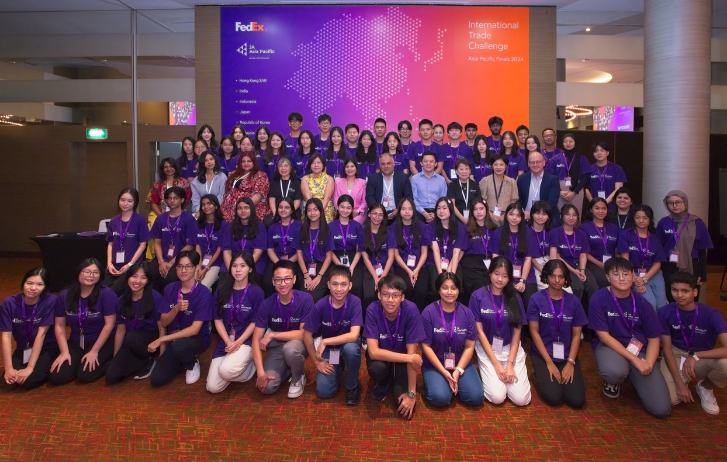
Empowering Young Entrepreneurs In Asia Pacific: Opportunities And Growth
By FedEx | First published: August 31, 2023 Updated: July 21, 2025
Economic incentives and emerging technologies are welcoming young entrepreneurs to the table. We explore how young entrepreneurs in Asia Pacific can find the right resources to launch and grow.
- Startup funding in Southeast Asia reached USD 2 billion in the first half of 2025, amid rising digital adoption and regional trade integration that are creating new opportunities for entrepreneurs.
- Youths across APAC are redefining success, seeking the freedom to create value on their own terms and achieve autonomy through entrepreneurship.
- Governments and organizations like FedEx are actively supporting youth entrepreneurship and SME development through grants, investments, and educational programs.
Entrepreneurship is the lifeblood of any economy, bringing fresh ideas for new products and services that drive growth and job creation. Whether it’s opening a small business in your neighborhood or aspiring to become the next tech giant, entrepreneurs today face a rapidly evolving market landscape with opportunities to expand into new markets.
Despite macroeconomic challenges, including the rapidly rising cost of living globally and geopolitical instability, Southeast Asia’s tech startups fared well in the first half of 2025, securing USD 2 billion in funding – up 7% year-on-year and driven by a surge in late-stage rounds.
The last few years have seen various economic disruptions, which counterintuitively present the perfect conditions for new businesses to thrive. As a result of big tech layoffs, thousands of workers with valuable, in-demand tech skills are now looking for their next gig, freeing up a wave of available ingenuity that was previously concentrated at a few big companies.
Societal change is also spurring people to pursue the freedom of being their own boss, carving their own path to success, and creating greater work-life balance with health and well-being in mind. At the same time, emerging digital technologies like artificial intelligence (AI) and the rise of social commerce offer lower barriers to entry for small businesses to spring up at lightning-fast speeds.
Across Asia Pacific, a new generation of young entrepreneurs is redefining success: seeking purpose-driven work, flexible lifestyles, and the freedom to create value on their own terms. For many, the clearest path to achieving this autonomy is through entrepreneurship.
With swift digital adoption, shifting consumer expectations, and deepening regional trade integration, first-time founders are able to build impactful, scalable businesses in an increasingly connected economy. Competition exists – but so does opportunity, especially for entrepreneurs who make use of the plethora of available tools to grow their business.
The APAC advantage: Funding, trade, and growth for young founders
Globally, about one quarter of the estimated 600 million entrepreneurs are under the age of 35. In Thailand, for instance, that entrepreneurial spirit is even more pronounced, with 81% of women in Thailand expressing interest in starting their own business.
This comes at a time when the rollout of the Regional Comprehensive Economic Partnership (RCEP) is supercharging regional integration, unlocking startup opportunities by making it easier for businesses to scale across borders. The agreement lowers tariffs, simplifies customs procedures, and links economies from China to New Zealand, offering fertile ground for startups, entrepreneurship, and SME development.
Additionally, supply chain diversification continues to shift manufacturing demand toward Indonesia, Thailand, and Vietnam, where young entrepreneurs can now tap into cost-effective growth.
Tech levels the playing field
Amid ongoing economic uncertainty and widespread tech layoffs across the region, many skilled professionals find themselves at a crossroads – facing shrinking job prospects while holding valuable digital expertise.
Paradoxically, while the job market tightens, it’s never been easier – or more affordable – to start a business. Thanks to advances in cloud computing, no-code platforms, and digital tools, the cost of launching and running a company has dropped.
The latest McKinsey Global Survey on AI found that those who used generative AI across various business functions have reported cost reductions. These tools have democratized access to markets, allowing young entrepreneurs in APAC to test and scale ideas faster than ever before.
Asia Pacific continues to experience rapid digital growth, with AI adoption emerging as a key driver of entrepreneurial growth. More founders are integrating data-driven technologies, AI, and machine learning into their operations to unlock new business models, automate decision-making, and scale faster. From AI-powered chatbots to predictive analytics, these innovations are helping businesses in APAC build future-ready enterprises capable of serving global markets.
Resources that bring ideas to fruition
For young and aspiring entrepreneurs, finding the right resources and education can significantly impact success. At FedEx, we understand the importance of nurturing the next generation of dreamers and building bridges for young entrepreneurs to reach their potential.
That’s why, since 2007, we have supported the APAC FedEx/JA International Trade Challenge (FedEx/JA ITC) program to educate and inspire students to better understand entrepreneurship and think globally through practical teamwork exercises and classroom learning.
The initiative has engaged over 45,000 students across the region, providing them with access to industry leaders and entrepreneurs, and introducing them to the world of business, economics, and international trade.
Each year, students are encouraged to produce real-world business proposals that demonstrate inventive thinking, connections to new markets, and potential for community involvement and social responsibility. Year after year, the competition has seen strong collaboration from the industry, with leading entrepreneurs joining as judges and mentoring the students.
FedEx also supports growth-stage businesses through the FedEx Small Business Grant Contest (SBGC), which is active in 31 international markets across Asia Pacific, Europe, and Latin America. The program offers funding and visibility to help SMEs expand operations and enter new markets.
In addition, the FedEx Innovation Lab (FIL) connects FedEx with early-stage technology startups, such as e-commerce logistics provider Floship, and makes investments in these companies across the region. These initiatives help young entrepreneurs in APAC scale innovative solutions regionally and globally.
National governments are stepping up to support young, local visionaries as well. From Malaysia’s Young Agropreneur Grant, which encourages youths to venture into agro-entrepreneurship, to Australia’s Industry Growth Program, offering grants of up to AUD 5 million for SMEs to commercialize their big ideas, public policy is increasingly geared toward fostering youth entrepreneurship and SME development.
With the backing of modern tech, robust trade frameworks like RCEP, and educational and financial support from various organizations, the path from idea to impact is clearer, faster, and more accessible than ever before.
Young entrepreneurs now have the tools to navigate challenges, capitalize on emerging trends, and drive meaningful change in their communities. Leveraging these solutions will help them achieve long-term, sustainable success.
SHARE THIS STORY
- 85% Of APAC Businesses Plan To Expand Into Europe, According To New FedEx Report
- Generative AI: A New Frontier
- How To Ship A Giant Panda
- The Rise Of Intra-Asia Trade: Opportunities In The China-Southeast Asia Corridor
- Where Do Old Planes Go When They Retire?
- What’s So Dangerous About Coconuts? Your Guide To Dangerous Goods Logistics
Sign up now and save on your shipping rates!
Sign up now and earn discounts by shipping instantly with FedEx Ship ManagerTM at fedex.com.
Recommended For You

How To Empower More Women In STEM Fields
It’s essential to create more opportunities for girls and women in STEM industries.
Read More
Top 3 Trends For The Future Of Entrepreneurship
Becoming an entrepreneur is now the first choice for young people in Asia, who aspire to found new businesses over traditional employment.
Read More
How One Hong Kong Entrepreneur Is Changing The Game In Menstrual Health
Social impact entrepreneur Olivia Cotes-James explains how her company, LUÜNA, tackles menstrual health, one period at a time.
Read More

